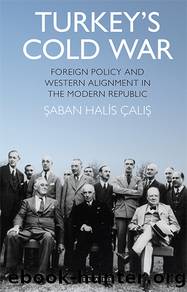Turkey's Cold War by Saban Halis Çalis

Author:Saban Halis Çalis [Çalis, Saban Halis]
Language: eng
Format: epub
Tags: History, Middle East, Turkey & Ottoman Empire, Political Science, International Relations, General
ISBN: 9781786731074
Google: GBOMDwAAQBAJ
Publisher: Bloomsbury Publishing
Published: 2016-11-30T22:29:59+00:00
The Military's Middle East Policy
The generals' decision to apply for full membership was one of the contributions they made to Turkey's EC policy. However, the 12 September coup also adversely affected Turkey's relations with the Community. Perhaps until October 1981 Brussels had not perceived the coup as a negative factor in its relations with Turkey, and had allowed the association to continue in operation,63 but once the army started restricting democratic freedoms and violating human rights, the EC began to criticise Turkey. First of all, the dissolution of political parties set the Commission against Ankara, and it announced its intention to delay the implementation of the Fourth Financial Protocol.64 Following this, the European Parliament (EP) endorsed a resolution suspending relations, mainly due to anti-democratic policies, massive arrests and trials against workers' unions and the Turkish Peace Association.65 In the meantime, the EC Council still favoured the continuation of relations, but after the Tindemans Report criticising Turkey in the same vein as the other institutions, the Council revised its opinion and decided to suspend the association indefinitely in March 1982.66 For political reasons, Brussels also refused to implement the Fourth Financial Protocol decided in 1980 and withheld the 600 million ECUs that had been agreed.67 All other relations were also frozen and Turkey's EC policy reached deadlock. The Community's trade and financial policies profoundly disappointed the Turks, but the decision to suspend relations forced them to reconsider Turkey's foreign policy as a whole.
Although the traditional ideas regarding Turkey's place in Western organisations did not change drastically, the Turks now began to complain about the West's criticisms concerning human rights and the military regime. Turkey's expulsion from the Council of Europe was the last straw, compelling Ankara to use different language against the West.68 For example, General Evren was of the view that âwe count ourselves European and we are very proud of it, but if Europe does not accept this, then the responsibility belongs to them ⦠Turkey can join other groups, other blocsâ.69 According to Evren, Turkey could do without the West if they continued to âmake things more difficultâ,70 openly declaring the Middle East as a possible alternative to Europe.71 Some even felt that it was necessary to remind the West of Turkey's Middle Eastern identity. Other Turkish authorities talked about developing a multi-dimensional foreign policy, similar to that which was discussed in the 1960s.72
There were many reasons at the root of such declarations and appeals to look for alternatives. The most important, however, was Turkey's lack of political credibility in international relations which could have been used to solve its problems with the West. As in the previous cases, Turkey had to create new reasons for the West to consider it a respected European country.73 The Turks, who had embarked upon an export-oriented economic policy, also needed new markets for exports and money for investment.74 While Turkey's dream of European markets seemed to be fading away, the Middle East emerged as a new hope.75 As Turkey's trade with the Middle East grew its economic relations with Europe declined significantly.
Download
This site does not store any files on its server. We only index and link to content provided by other sites. Please contact the content providers to delete copyright contents if any and email us, we'll remove relevant links or contents immediately.
| Bahrain | Egypt |
| Iran | Iraq |
| Israel & Palestine | Jordan |
| Kuwait | Lebanon |
| Oman | Qatar |
| Saudi Arabia | Syria |
| Turkey | United Arab Emirates |
| Yemen |
Empire of the Sikhs by Patwant Singh(23084)
The Wind in My Hair by Masih Alinejad(5095)
Rise and Kill First by Ronen Bergman(4785)
The Templars by Dan Jones(4689)
The Rape of Nanking by Iris Chang(4211)
12 Strong by Doug Stanton(3548)
Blood and Sand by Alex Von Tunzelmann(3203)
Babylon's Ark by Lawrence Anthony(2676)
The History of Jihad: From Muhammad to ISIS by Spencer Robert(2628)
No Room for Small Dreams by Shimon Peres(2368)
The Turkish Psychedelic Explosion by Daniel Spicer(2356)
Inside the Middle East by Avi Melamed(2355)
Gideon's Spies: The Secret History of the Mossad by Gordon Thomas(2350)
Arabs by Eugene Rogan(2299)
The First Muslim The Story of Muhammad by Lesley Hazleton(2271)
Come, Tell Me How You Live by Mallowan Agatha Christie(2260)
Bus on Jaffa Road by Mike Kelly(2159)
1453 by Roger Crowley(2030)
Kabul 1841-42: Battle Story by Edmund Yorke(2028)
